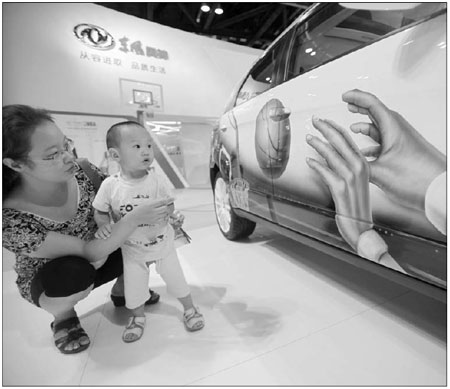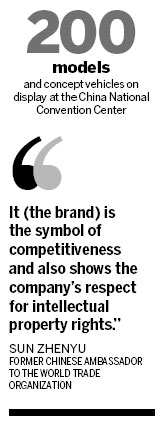-
News >Bizchina
Domestic cars the stars at auto expo
2011-07-20 10:38BEIJING - A recently concluded auto show had no dancing girls, no ear-splitting music - not even much of an audience bustling through the exhibition hall.
But there were some superstars: Cars entirely developed in China.
The second Chinese Brand Auto Expo in Beijing from July 8 to 13 was a collective presentation of the nation's proprietary automobiles.

Young visitor considers the paint job on a domestic car on display in Beijing last week. Foreign car brands now have 70 percent of China's auto market, so homegrown vehicle makers are boosting efforts in design, technology and production.?[Photo/China Daily]
Some 20 Chinese automakers including Chery, Geely, Yutong, Brilliance and Beijing Automotive showcased more than 200 of their latest autos and concept vehicles in the 30,000-square-meter exhibition hall.
They also brought self-developed core components such as engines, transmissions and battery cells.
Zhejiang-headquartered Geely Holding Group - with its three major brands Englon, Gleagle and Emgrand - participated in the annual event for the first time.
Its 14 latest car models and other products - including the 6AT automatic transmission with world-class technology - were on show to display its cutting-edge production capacity.
Shenyang-based Brilliance Auto had a prominent position at the entrance of the exhibition hall. Eye-catching exhibits included the Brilliance 530, the company's new flagship model planned for release in August, and the Brilliance EV electric concept car.
Rong Huikang, an industry expert at the China Association of Automobile Manufacturers, said China's auto industry will be competitive globally only when its home-developed brands first "take a dominant position in the market".
"And then by mastering essential technologies we can develop any type of vehicle we need."
Rong's thoughts were echoed by Sun Zhenyu, former Chinese ambassador to the World Trade Organization, who noted that "the brand is the lifeblood of a company".
"It is the symbol of competitiveness and also shows the company's respect for intellectual property rights."
"Seeking new energy sources has become a global trend," he added. "So China should make effort to develop core technologies for clean-energy vehicles.
"The government should provide special funds to research organization, with achievements then commercialized in partnership with companies."
But he added that encouraging independent development of Chinese companies is not contradictory to an open market.
"Introducing foreign capital and establishing joint ventures help Chinese automakers upgrade their own development capacity. It is a good way to learn," Sun said.
Foreign car brands now have 70 percent of China's car market, he noted.
"The market is already open and cannot be closed," he added.
"Chinese brands must also enter the global competition to sharpen their competitive edge."
